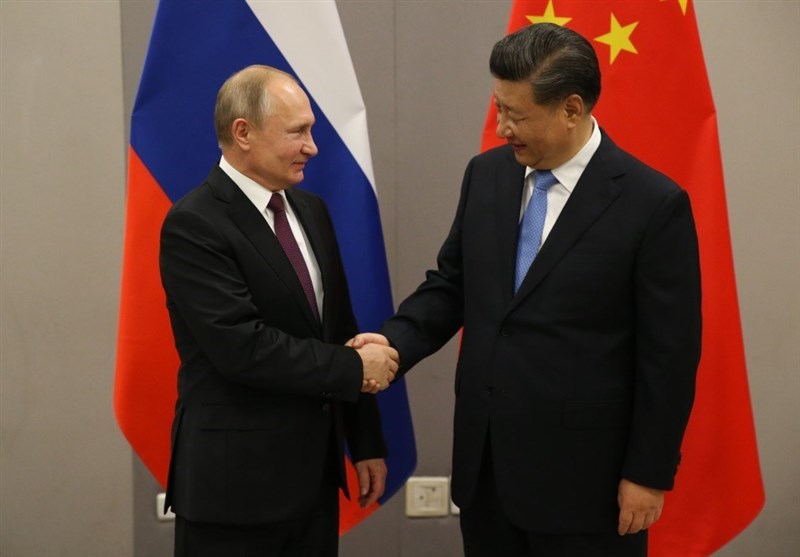Russia and China are two transregional powers in the international arena which share 4,200 kilometers of borders. Border disputes among countries are considered normal especially when the joint borders are vast and extended in only 650 kilometers of land and the rest marine borders. However, how are differences between two neighboring powers set aside in view of joint efforts and cooperation?
During the past decade, the international system has been facing the emergence of an economic superpower which has overshadowed the hegemony of the United States. On the other hand, Russia which is experiencing isolation in the years after the collapse of the Soviet Union emerged as a transregional superpower and the presidency of Donald Trump provided Kremlin with the chance to strengthen its position and play a key role in the settlement of regional and international crises; and of course, inter alia, the existence of a common enemy has resulted in the convergence of two oriental powers on various issues.
Moscow and Beijing have been always facing a common threat by the United States and the NATO which has encouraged extensive cooperation among the two permanent members of the Security Council of the United Nations to form alliance and coalition and set up another pole in international arrangements attracting many regional and transregional players under their own oriental doctrine. Even though Russia has been pursuing multilateralism in the international order in the past several years and believes that Washington should admit that it is no more the global hegemony and other emerging powers such as China, Russia and …are playing a decisive role in making decisions on various world problems, many Russian pundits believe that there is now a new bipolar system in the new world order: i.e. the United States and China.
It seems that the foreign policy discourse of the United States in the past decade has focused on two key words of “rivalry” and “hostility” in dealing with Russia and China. In fact, after the re-election of Putin in Russia which coincided with Barack Obama’s term in office, Washington focused on hostility with Moscow and rivalry with Beijing. During the Trump period, both countries were traditionally considered as threats from the viewpoint of the White House. However, the American discourse undergone little changes and Washington’s view to China and Russia was pursued respectively on the basis of hostility and rivalry. In fact, the United States in each of these periods put excessive political pressure and economic sanctions on one and rivalry with the other, conveying the message that it can withdraw from coalition and experience a better climate—an issue which seems would continue during the Biden tenure within the framework of the concept of hostility and animosity in the view of the White House to define its relations with Kremlin. However, on the other hand, Russia believes that Beijing would not pursue ambitions and anxiety despite all the differences between the two countries and therefore this approach by the United States cannot make the relations between Russia and China fragile. For this reason, Moscow and Beijing have defined fundamental strategic cooperation during the past several years and have realized such cooperation—cooperation which is in the areas of wide-ranging economic dealings especially in the energy sector as well as security and military cooperation which led to deepening military ties in the space in view of the shadow of threats by the United States and NATO. The Russians are well aware that if such partnership is shattered, the first outcome would be the isolation of Moscow. Therefore, they made efforts to realize this Russian proverb which says “wherever there is sustainable friendship, things will move smoothly”. We can properly detect such an approach in the exploitation of the Siberia power line by the end of 2019 according to which 38 billion cubic meters of natural gas will be transferred to China on an annual basis until the end of 2025 and the National Chinese Oil Company is going to buy 85 percent of the transferred gas.
In addition to cooperation between the two permanent members of the Security Council of the United Nations, the contribution of Russia and China to technological advances have been also remarkable and it seems that a new window of opportunity has opened in the relations between the two powers as Russian President Putin has named 2020 and 2021 as the year of Russia-China science and technology. This is so much a conversion which, in the words of China’s ambassador to Russia, resulted in the highest level of the strategic partnership between the two countries under the complex international conditions in the aftermath of the outbreak of Covid-19.
In the meantime, in spite of Washington’s view that considers China and Russia as permanent threats that should be contained and insolated through the instrument of sanctions, Moscow and Beijing, on the other hand, have been pursuing a pragmatic approach based on realism to maximize their cooperation and relations with the West with the aim of neutralizing Washington’s isolation efforts.










0 Comments